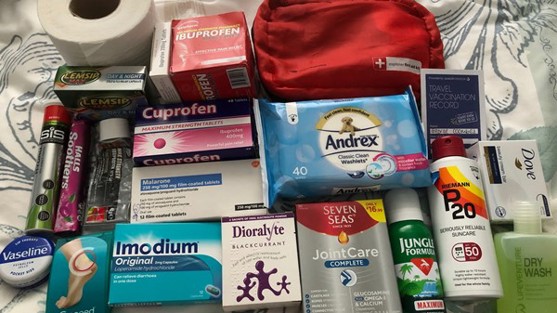Kilimanjaro Blog 3: Getting vaccinated
In the third blog post, George reveals some of the realities of getting medically ready to do the trek.
Another major consideration when trekking up Kilimanjaro is to consult a travel doctor to ensure you have the right jabs and vaccinations.
I couldn’t remember having any jabs since I was in uniform at school (so about 26 years ago!). The first thing I had to get done was my booster jabs that we are meant to get every 10 years or so. The travel doctor said I wasn’t alone and that most people forget as the NHS don’t send out reminders about these… and people only really get them if they’ve been seriously ill or they are travelling somewhere remote.
So, I had to have three jabs in total just to get my body to where it should be! I’m not afraid of needles, so that wasn’t an issue, but boy did my arm ache that evening, and the next day! She did warn me, but I didn’t really think it would hurt/ache that much!
During the consultation, which lasted about 40 minutes, we went through where I was travelling, what I was doing and how I would be interacting with locals. Concluded that I wouldn’t need yellow fever vaccination as I’m flying direct into Tanzania and not travelling outside the country (mainly the neighbouring country, Kenya, which is a high-risk area for yellow fever).
I do however need:
- Malaria vaccination (Malarone) – 23-day course as have to take it two days before I go and then for a whole week after I get back
- Rabies vaccination – she said it was up to me. I didn’t have to have it as risk was unlikely – but decided that I would, just in case. This involved three jabs over a course of a month. It doesn’t actually protect me should I be bitten – it just gives me a further 12 hours (so 24 hours in total) to receive urgent medical attention!
- Cholera (Dukoral) – as we will be drinking water from the mountain (although using purification tablets etc) we decided that the risk wasn’t worth it. This course of vaccination is in drink form. Two doses over a course of a week.
And that’s it! Only cholera and the usual booster type vaccinations are available on the NHS. Malaria and rabies had to be purchased. £64 for Malarone and £157 for the Rabies vaccinations. Unfortunately, the NHS couldn’t source any Dukoral – so that had to be purchased privately through a chemist at a cost of £58.
So – I’ve got a lot of medication flowing through my body – the side effects of which will more than likely bring on nausea (definitely the case with the malaria vaccination) which isn’t exactly ideal when I will be feeling sick anyway through altitude sickness! On top of this we have been told that it is quite common to have diarrhoea at some stage on the mountain… the joys!
I’ve purchased some over the counter diarrhoea medication together with some rehydration medication to take at the same time. Staying hydrated is important to combat altitude sickness. Another side effect of altitude sickness is losing your appetite… so we have been warned in advance that our chief guide will constantly badger us to eat all our dinner!

Better remember to pack some sick bags and toilet roll!!









